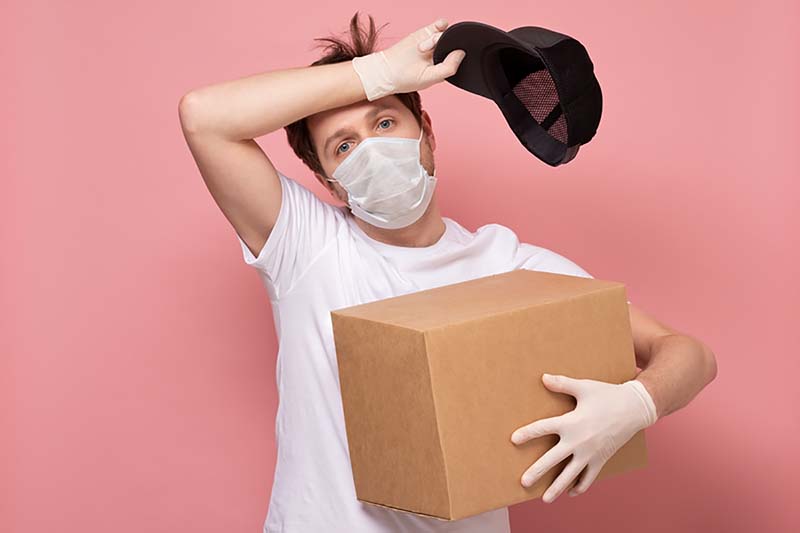Managing Face Covering Requirements and Overheating
Employers have had to scramble to comply with several new federal, state, and local health directives intended to help combat the spread of COVID-19....
7 min read
 Wendy LeClair
:
Mar 1, 2022 11:47:00 AM
Wendy LeClair
:
Mar 1, 2022 11:47:00 AM

For the first time in history, employers have had to navigate workers’ compensation insurance during a global pandemic. It seems that just as quickly as new information comes out to address one situation, a new concern emerges, often leaving businesses scrambling for answers. In this post, you will find answers to some of the most common questions we’ve been hearing from employers during the last two years.
It depends. As with every potential workers’ compensation insurance claim, the assigned Department of Labor & Industries (L&I) claim adjudicator will review the claim and issue allowable orders on a case-by-case basis. The adjudicator takes all relevant information about the particular situation into account when making a decision about allowance. For a COVID-19 claim to be covered by workers’ compensation insurance, the adjudicator will determine if the case:
For the claim to be allowed, there needs to be a more than probable link to the job site as the source of the claimant’s COVID-19 exposure. For example, claims from high-risk work environments such as healthcare will likely be covered.
According to L&I, claims will likely be denied if the contraction to COVID-19 is incidental to the workplace or is common to all employment. An example of when a claim may be denied would be when an employee believes they contracted the virus from a co-worker, but there is no outbreak in the workplace.
If a worker tests positive for COVID-19 and L&I has allowed the claim, the worker will be entitled to all necessary benefits, including treatment and time away from work. These benefits include costs associated with diagnostic testing, medical treatment, in-patient hospitalization, time loss benefits if unable to work, and even death benefits in severe cases.
Possibly. With the COVID-19 pandemic moving into its third year, some employers are starting to see closed COVID-19 workers’ compensation claims reopen due to lasting health effects such as brain fog, circulation, cardiac, and respiratory issues. Depending on the symptom, such as a permanent loss of taste or smell, some claimants may be eligible for a permanent impairment award as well. The L&I claim adjudicator will review medical findings to determine when claims can and should be reopened.
Not at this time. L&I has stated that even if a COVID-19 case is allowed as a workers’ compensation claim or when a claim is reopened, costs associated with the claim will not be included when evaluating the business’s experience modification rate. L&I uses the experience modification rate to determine a business’s insurance rate. Additionally, eligible businesses will not lose their claim-free discount if they have a COVID-19 claim(s). A claim-free discount is an additional insurance discount for not having indemnity claims, such as time loss or permanent partial disability awards. However, since COVID-19 appears to be here to stay, this policy could change in the future.
No. Like insurance rate calculations, COVID-19 claims will not be used when L&I calculates losses used in Retrospective Rating Programs, often referred to as “Retro.” Retro is an optional safety incentive program offered by L&I that allows organizations to earn a partial refund on their workers’ compensation insurance premiums if they reduce their workplace injuries and the costs associated with those injuries.
Probably. According to the Occupational Safety and Health Administration (OSHA), COVID-19 is considered a recordable illness case on the OSHA 300 Log if:
A confirmed work-related COVID-19 case would be recordable on the OSHA Log if the employee is under quarantine and can’t work remotely. Therefore, impacted employers should record the case as an “illness.” They should also count the number of calendar days that the employee was excused by a health care professional or was unable to work and any days that the worker was on modified duty if applicable.
An employee’s COVID-19 case is likely not work-related if the employee was the only one in their vicinity to contract COVID-19, and their job duties do not include having regular contact with the general public or involve other high-risk activities.
Not necessarily. L&I requires employers to provide all employees and contractors who were at the same worksite as a person who tested positive for COVID-19 with written notice of potential exposures within one business day. Employers should notify workers to monitor themselves for signs of COVID-19 and recommend that they get tested if they start to present with any symptoms.
Employers must also take appropriate steps to protect the rest of the workforce from exposure to the virus. These steps include cleaning and disinfecting the work environment if the employee was present leading up to the confirmation and continuing to screen workers for signs and symptoms of the virus.
Additionally, employers should maintain confidentiality as required by the Americans with Disabilities Act (ADA) if a worker is suspected or confirmed to have COVID-19 and continue to monitor the US Equal Employment Opportunity Commission’s (EEOC) COVID-19 site for updated information.
Possibly. L&I considers home workspaces to be an extension of the office workspace and, as such, carry the same type of risks for valid on-the-job injury claims. To determine whether the injury occurred “in the furtherance of the business,” one first needs to determine if the injury occurred while the worker was doing their normal job functions or if they deviated from the normal functions of the job while they were at home. For example, if a worker unloads the washing machine during work hours and pulls a muscle in their back, the claim would be rejected by L&I because laundry is not part of the worker’s job duties. On the other hand, if the worker got up from their desk chair and tripped over an extension cord used for their workstation, the claim would likely be allowed as a valid injury because the incident would be considered a normal deviation. Therefore, it is critical that employers set strict guidelines for safe workspaces and outline what should and should not be done during business hours while working at home. Eligible members are encouraged to see Archbright’s Home Office Safety Guide in the mozzo Resource Library for additional helpful information.
Potentially. Like the answer above regarding OSHA Logs, employers first need to determine if the injury or illness is work-related. To do so, employers should investigate the injury and determine how the worker injured themselves and what the contributing factors were. OSHA defines the work environment as the establishment or location where one or more employees are working or are present as a condition of their employment. It includes not only physical locations but also equipment or materials used by the employee during their work. Therefore, injuries and illnesses that occur at home during the employee’s regular work hours could be deemed work-related and potentially recordable on the log.
Remember, even when cases are determined to be work-related, to be recordable on the OSHA 300 Log, the worker needs to:
In the event where the injury or illness results from a non-work-related event or exposure that occurs outside of the work environment, the case would not be considered work-related. For example, if the worker played basketball on their lunch break and sprained their ankle, the case would not be recordable because they acted outside their normal work environment activities. By conducting incident and near-miss investigations for all work environment incidents, whether at home or in the workplace, employers should gather the information needed to determine whether cases are recordable or not and identify ways to help prevent future incidents.
It depends. If a worker seeks treatment for an adverse reaction to a vaccine and they subsequently file a claim, L&I will want to answer the same basic questions they ask on every industrial injury claim as outlined above. The claim’s adjudicator will collect additional information, such as:
Ultimately, whether the employer mandates the vaccination or not, if the worker receives a vaccination while in the course of employment, and there is a resulting injury due to an adverse reaction to the vaccine, it would likely be covered as a valid insurance claim.
Yes. However, the worker will not be paid for the first three days after the vaccine was administered unless the worker is medically required to remain off work on the 14th day after the vaccination.
It depends. If employers require employee vaccination as a condition of employment, then adverse reactions to the COVID-19 vaccine will be considered work-related. The case would still need to meet one or more of the general recording criteria to be considered recordable on the OSHA 300 Log, such as if an employee receives treatment beyond first aid, is written off of work, or is assigned modified duty.
If employers do not require their employees to be vaccinated as a condition of employment but recommend it, any adverse reactions will not be considered work-related for the OSHA Log. But, for this stipulation to apply, the vaccine must truly be voluntary.
Yes. Although regulations and guidance continue to evolve, both L&I and OSHA have COVID-19 stipulations for employers to follow. Employers should monitor and follow local, state, and federal guidelines regarding protection protocols, such as whether workers must wear face coverings, maintain six feet of physical distance from others, and wash their hands frequently.
We understand that each employer has had to adapt during the pandemic, is dealing with unique situations related to COVID-19, and may have additional questions. Archbright members have unlimited access to the HR and Safety Hotlines for assistance.

Employers have had to scramble to comply with several new federal, state, and local health directives intended to help combat the spread of COVID-19....

Amid the COVID-19 pandemic, many employers face difficult decisions regarding business operations. Decreased product demand, staff shortages, and...

On March 12, 2022, Washington, Oregon, and California joined other states across the country by lifting mandates that required the use of masks in...